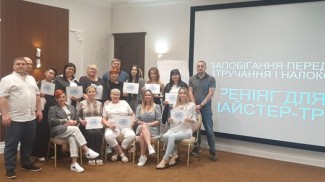Stop Overdose Safely: UNODC successfully trained Ukrainian CSOs on emergency management of opioid overdose

From 6th to 8th June 2023, the UNODC Programme Office for Ukraine (POUKR) and the UNODC Prevention, Treatment and Rehabilitation Section (PTRS), jointly with Ukrainian NGOs, “Club Eney” and “Conviktus”, organized an in-person “Stop Overdose Safely (S-O-S)” training in Khmelnitskyi, Ukraine. The training is a follow-up to the UNODC-WHO S-O-S initiative that was introduced in Ukraine in 2018, with the aim to prevent, identify and manage opioid overdose, including the provision of take-home naloxone.
The S-O-S Initiative is in line with the WHO guidelines on community management of opioid overdose (2014), recommending that people likely to witness an overdose should have access to naloxone, - an opioid antagonist that can reverse an opioid overdose when given timely -, and be instructed in its administration to enable them to use it for the emergency management of suspected opioid overdose. Also, resolution 55/7 of the Commission on Narcotic Drugs and the outcome document of the UNGASS 2016 Special Session on Drugs support effective overdose prevention and emergency management with naloxone.
The global S-O-S Initiative has set a goal that 90% of all people likely to witness an opioid overdose should be trained on overdose management, 90% of those trained should be equipped with naloxone and 90% of those equipped with naloxone should carry it on them, to be able to respond effectively in the case they witness a suspected opioid overdose. People likely to witness an overdose can be people who use drugs, their peers and companions, family members, first responders and other members of the community. In the framework of a previous S-O-S study, UNODC and WHO have demonstrated the successful implementation of the 90-90-90 goals and thus the feasibility of take-home naloxone schemes in low- and middle-income countries.
According to the UNODC (2022) report, “Conflict in Ukraine: key evidence on drug demand and supply”, in 2018-2020, the size of the adult population injecting drugs in Ukraine, mostly opioids, was estimated at 350,000 people or 1.7% of adult population. This is among highest prevalence observed in the world. Most of the opioids injected include methadone and home-made acetylated opium sold on illicit markets. Furthermore, according to a national database1, at least 319 cases of deaths were associated with an overdose due to psychoactive substance use in 2019, with almost half attributed to opioid overdose. In comparison with the year 2018, a significant increase was documented in overdose in the country.
Despite being in the midst of war, a total of 14 trainees from nine different NGOs across Ukraine, completed the S-O-S training of trainers, which was delivered by two Ukrainian Master Trainers who were trained previously as part of the original S-O-S training cascade in 2018. Many of the trainees who came together in Khmelnitskyi had prior experience in witnessing an overdose and were highly motivated to join the training. Following this S-O-S training, they will reach out to the communities in their hometowns and apply their newly acquired knowledge and skills to build the capacity of people likely to witness an overdose to save a life through effective emergency support.
In Ukraine, as an outcome of the earlier UNODC/WHO S-O-S project, naloxone has become available as an over-the-counter medication for overdose management, and thus more available. At the end of the training, each trainee was provided with a sample naloxone kit to carry and use in case of need. Whilst most of the trainees were initially not equipped with sufficient skills or did not feel confident enough to intervene in overdose situations, following the training, all of them expressed that they were ready to address a potential opioid overdose.
UNODC stands ready to continue supporting countries in their efforts to effectively address opioid overdose, opioid use disorders and the negative health and social consequences of drug use. The International Standards for the Treatment of drug use Disorders, published by UNODC and WHO in 2020, describe a continuum of care of evidence-based interventions from low-threshold, unconditional support to interventions in specialized drug use disorder treatment services.
This S-O-S training in Ukraine was made available thanks to the financial support of the U.S. Department of State, Bureau of International Narcotics and Law Enforcement Affairs (INL).
For further information on the S-O-S initiative, you can contact the UNODC Prevention, Treatment and Rehabilitation Section (PTRS). Additional information is also available here: